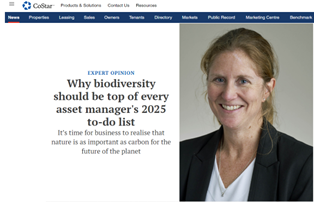Building biodiversity: It’s time for business to realise that nature is as important as carbon for the future of the planet, our Vicky Cotton, ESG Director, writes in CoStar News.
An estimated $44 trillion of economic value generation – over half the world’s total GDP – is moderately or highly dependent on nature and its services, according to the World Economic Forum. From agriculture and forestry to fisheries and tourism, businesses across sectors rely on thriving ecosystems to function.
Yet the reality is that human activity has pushed the planet’s natural systems to the brink. The Living Planet Index shows a 69% decline in global wildlife populations between 1970 and 2018.
The journey ahead is not an easy one. But the Taskforce on Nature-related Financial Disclosures (TNFD) is poised to transform property investment in 2025. Today, 502 companies and financial institutions with $17.7 trillion assets under management have committed to getting started with voluntary reporting of their nature-related issues, in line with the TNFD roadmap being piloted throughout the coming year. The 14-point framework is set to ensure large global companies and financial institutions “regularly monitor, assess and transparently disclose their risks, dependencies and impacts on biodiversity”.
It’s clear that TNFD is gathering momentum, so it’s vital for property investors to grasp the potential of the measure and start creating a biodiversity strategy now – to be ready for the pilot phase – before a final set of recommendations are put forward in late 2025.
Property investors and asset managers must now commit to biodiversity strategies in preparation for TNFD – from grass roots changes to overarching evergreen strategies. The framework contains practical strategies to measure and report on nature-related impacts, while addressing data and methodological challenges.
In line with this bid to increase biodiversity, and in preparation for the increased focus in reporting, our ESG team has been working at the highest levels to create biodiversity strategies for our institutional fund clients. Meanwhile, our onsite teams have been hard at work at the grass-roots level, helping devise initiatives large and small – including living walls, green roofs, allotment schemes, community gardens and wildflower meadows.
The imperative for action is clear. As the world races to halt and reverse biodiversity loss by 2030, TNFD will be a critical tool in mobilising the private sector to be part of the solution, just as the Taskforce on Climate-related Financial Disclosures (TCFD) has done for climate change.
In 2025 and beyond, the companies that thrive will be those that have embraced the TNFD and made nature a strategic priority. It is a transformation that is not only essential for the health of our planet, but also for the long-term success and resilience of businesses themselves.
Feedback on the proposed TNFD roadmap is encouraged from businesses, financial institutions and other stakeholders, with a public consultation period open until 17 January 2025.
This article originally appeared in CoStar News.
Find out more about Workman’s bid to build biodiversity:




